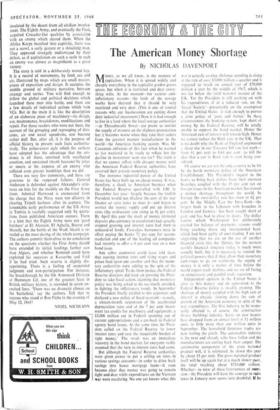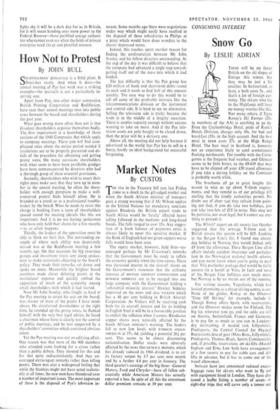The American Money Shortage
By NICHOLAS DAVENPORT
MONEY, as we all know, is the manure of capitalism. When it is spread widely and
cheaply everything in the capitalist garden grows apace, but when it is restricted and dear every- thing wilts. At the moment—for various anti- inflationary reasons—the lords of the sewage works have decreed that it should be very • restricted and very dear. (This is one of several reasons why our businessmen are cutting down their industrial investment.) Now it is bad enough to live in a land where the local sewage authorities —in Threadneedle Street—are prone to restrict the supply of manure on the slightest provocation but it becomes worse when they take their orders from the greatest manure manufacturer in the world—the American banking system. Was Mr Crossman oblivious of this fact when he warned us last weekend to be ready to reflate lest the decline in investment went too far? The truth is that we cannot reflate with cheaper money until the American Federal Reserve authorities have reversed their present monetary policy.
The immense industrial power of the United States has been built up on cheap money. It was, therefore, a shock to American business when the Federal Reserve quarrelled with LBJ in December last year—largely because the foolish President would not disclose the cost of his war finance or raise taxes to meet it—and began to restrict the money supply and put up interest rates (the re-discount rate rising to 41 per cent). By April this year the stock of money (demand deposits plus currency in circulation) had actually stopped growing and interest rates had risen to unheard-of levels. First-class borrowers were in effect paying the banks 7f per cent for accom- modation and one of the leading oil companies had recently to offer a 6 per cent rate on a new bond issue.
Any sober economist could have told them that soaring interest rates and rising wages and prices feed upon one another and that the motile- tary authorities were adding to the spin of the inflationary spiral. To do them justice, the Federal Reserve directors did keep on pressing the Presi- dent to take fiscal action, claiming that monetary policy was being asked to do too much, unaided, in fighting the inflationary trends. In September the President finally yielded to this argument and declared a new policy of fiscal restraint—namely, a sixteen-month suspension of the accelerated depreciation rates and of the 7 per cent invest- ment tax credits for machinery and equipment, a $3,000 million cut in Federal spending out of current appropriations and a cut-back in Federal agency bond issues. At the same time the Presi- dent called on the Federal Reserve 'to lower interest rates and ease the inequitable burden of tight money.' The result was an immediate recovery in the bond market, for everyone rashly assumed that the turn in interest rates had come.
But although the Federal Reserve authorities were given power to put a ceiling on rates in various savings accounts—in order to drive back savings into house mortgage loans—it soon became clear that money was going to remain tight and dear while expenditures on the Vietnam war were escalating. No one yet knows what this
war is actually costing. Defence spending is rising at the rate of over $3,000 million a quarter and is expected to reach an annual rate of $70,000
million a year by the middle of 1967, which is not far below the total national income of the
UK. Yet the President is still pushing on with his expenditures, if at a reduced rate, on the 'Great Society'—presumably on the assumption
that the United States is rich enough to pursue a joint policy of 'guns and butter.' In these circumstances the banking system, kept short of money by the Federal Reserve, will be totally unable to support the bond market. Hence the American rate of interest will remain high. Hence we cannot reduce the Bank rate in the UK. That is no doubt why the Bank of England engineered a sharp rise in our Treasury bill rate last week— from 61 per cent to 6.64 per cent -to kill the idea that a cut in Bank rate is even being con- sidered.
Of course we are not the only country to be hit by the harsh monetary policy of the American Establishment. The President's request to the banks to bring back dollars from their overseas branches, coupled with the 15 per cent tax on foreign issues in the American market, has caused a money shortage throughout the world. In Europe the euro-dollar rate has risen to 61 per cent. In the Middle East the Intra-Bank—the largest bank in the Lebanon with branches in London and Geneva—has been caught short of cash and has had to close its doors. The dollar famine which Washington has deliberately created for balance of payments reasons could bring crashing down any international bank which had been guilty of over-trading. I am not suggesting that we are on the eve of another financial crisis like the 'thirties, for the western world's financial structure today is much more soundly built, but it is necessary to remind the political powers that if they allow their monetary authorities to go on restricting the supply of money it is only a matter of time before the • world export trade declines and we are all facing an unnecessary and painful trade recession.
Independent opinion in the United States is alive to this danger and an opposition to the Federal Reserve policy is steadily growing. The shortage of money coupled with the high rate of interest is already slowing down the rate of growth of the American economy in spite of the war expenditures. The first industry to be mone- tarily affected is, of course, the construction (house building) industry. Starts on new houses have dropped from an annual level of II million units to little more than one million units in September. The household furniture trades are now feeling the pinch. The automobile industry is the next and already sales have fallen and the manufacturers are cutting back their output. The automotive component of the gross national product will, it is estimated, be down this year by about 15 per cent. The gross national product itself will be up again but at a much slower pace, the total reaching about $739,000 million. Whether—in view of these forerunners of reces- sion—the President will have the courage to raise taxes in January now seems very doubtful. V he
fights shy it will be a dark day for us in Britain, for it will mean handing over more power to the Federal Reserve—those purblind sewage authori- ties who cannot even see when the fields of private enterprise need cheap and plentiful manure.















































 Previous page
Previous page